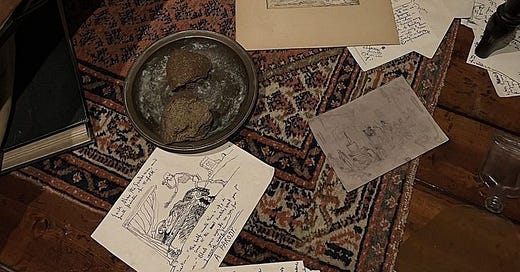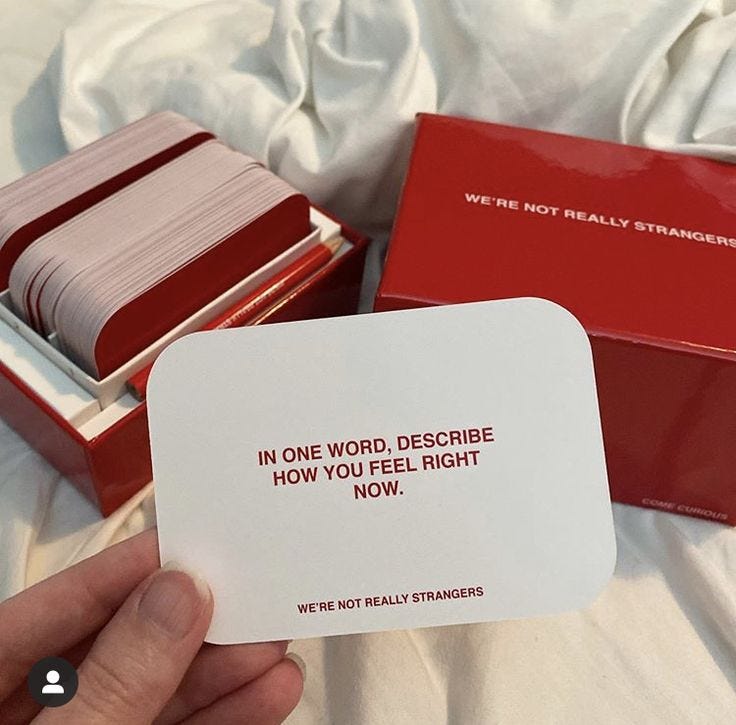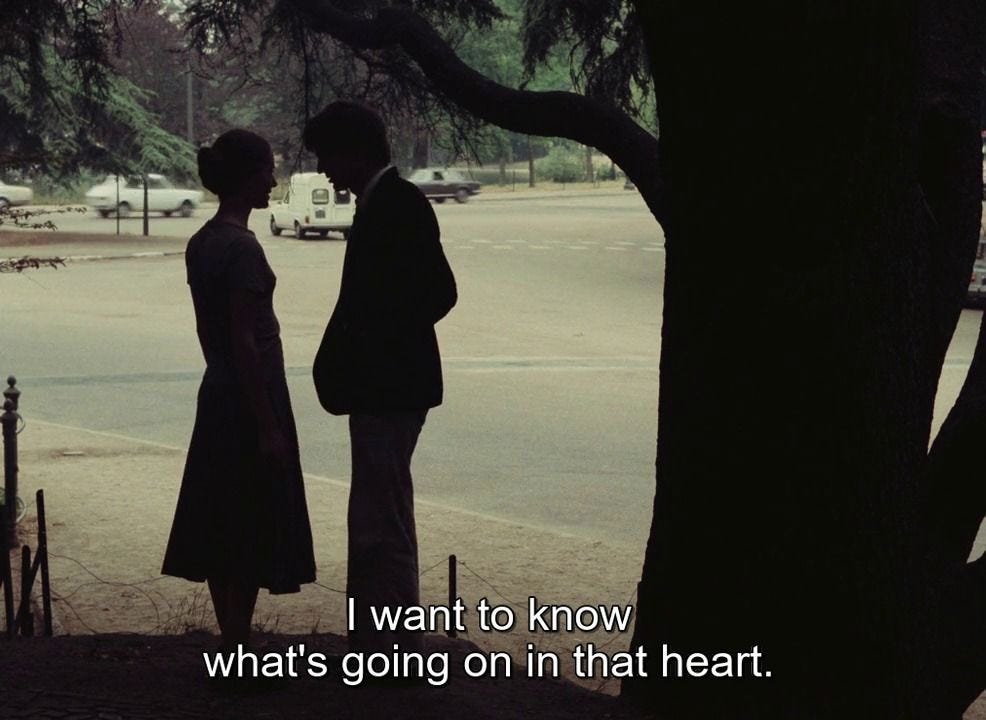All sources/media inspirations for this week’s essay are linked at the bottom for your exploration. ( + more )
For about two years, I’ve hidden a little red box in the corners of my rooms and the backs of my closets. Its contents: a hundred and fifty questions that promise to bring me ‘empowered, meaningful connections’1. I bought it intending to centre honest and raw conversations with whoever wandered into my life. If not for my tendency to carry similar questions around in my head, seconds away from inching closer into a person’s psyche and often succeeding, I would say I’d failed. The box has yet to be used between two people. Of course, I need those conversations that naturally veer off into the personal, but there’s something quite romantic about intentionally sitting down to lower each other’s walls. Even more so when the words ‘to be known is to be loved’ feel like your birthright.
Other people, perhaps humanity as a whole, have always been my greatest source of intrigue. It’s almost compulsive, the drive I have to truly understand how each one of us is comprised. In that regard, I consider myself an archaeologist of sorts, inspired by the simplest of clues. Just as a clay shard cast from antiquity can unearth an entire civilisation, a small habit can reveal layers of nature and nurture. The process of discovery is the same, probing delicately and with intent.
Except on a few occasions, this interest in others shouldn’t be confused with unregulated nosiness. Everyone has their boundaries, as do I. Oftentimes, like archaeologists who conduct their research long before breaking ground, listening and observing are enough for me. Perhaps my habit of monitoring myself extends to others. With others, I am far more compassionate. Instead, I take a different approach; I let myself be open to the opportunity of discovery. If I’m to learn more about you, it’s only fair you’re given a chance to do the same. And so I try to answer each question I’m faced with honestly, something I think others appreciate. What happens next is up to them.
‘It’ could happen anywhere. Maybe with a friend of a friend or with the guy who stops you on your lunch break collecting donations for charity 2. One truth can lead to a moment that makes your day. Answering “I’ve had better days” or “ I’m not doing the best” instead of “I’m fine” might make a difference. It could be the change from making noises to drown out the awkward silence to speaking for the sake of connection. To this day, one of the best compliments or praise I’ve received is that the conversations I’m able to have feel ‘refreshing’. That’s my ultimate goal. I want to go beyond understanding for my satisfaction. Maybe I can offer someone a space in which they feel free to dive into themselves and take a break.
But that moment of understanding is a coveted one. It feels like making sense out of chaos because, in the end, that is what we are: chaotic. Millions of fervorous neurons fire around the clock to keep our brains alive and dreaming as we breathe, laugh, cry and sleep over and over. There is no sense to be made of it beyond divine circumstance, and yet I’m able to find catharsis in our conversations. When you tell me about your parents or that time you felt what it is to be scared or loved, I can make sense of who you are and the why of it all.
I’m not the only person who thinks so: scientists call it ‘the beauty of understanding’, and to me, it far surpasses the beauty evoked by sensory experiences or aesthetic properties. This indescribable feeling is what drives the discipline of study and research and it is what drives me. To some, it’s like ‘looking into the face of God for non-religious people.’ 'It’s the leap to truth—beyond particulars—to something universal, something real.3
The study of humans naturally has been associated with the humanities whether this be sociology, philosophy, history and so on and rightfully so. I believe, however, that there must of course be a scientific element as well. If I were to examine how the best of us can evoke certain feelings or discoveries, I would regard it as both an art form and a scientific process. The best conversationalists have a fine-tuned formula and it wields incredible results. It’s why I agree with those who believe art and science differ only in ‘tempo and emphasis’. 4 The two are intertwined and cannot exist without the other. I may be able to learn of your health through multiple tests or examinations but it is with careful conversation and true compassion that I will know your heart and mind, thus experiencing you in totality.
However, both scientific discovery and conversational exploration require history. You would not let your doctor operate without the necessary medical history, just as you can’t know or explain yourself to others without understanding your past. I came across a quote by German writer Johann Wolfgang von Goethe who says, “He who cannot draw on three thousand years is living from hand to mouth”.5 Essentially, without knowledge of the past, your present is extremely limited. It’s because of our past that we have managed to evolve the way we have and live the way we do, in truth, we owe everything to it. In learning about our history, you see that ‘it is the only way to become a human being. It is the only way to become more than a naked ape’.5 And so I guess my fascination with history is just, as it’s only right for me to be equally enamoured with what births the subject of my inquiry.
I take my history quite seriously. I am irrevocably linked to it. You may have parts of me but there is no way to experience all of me without knowing it or following me back in time. By this, I mean witnessing me back home in Lagos, or somewhere just as poignant. Amsterdam, for example. All of this, the exploration alone and with others, digging back in time in hopes of uncovering new meaning, is the height of enjoyment for me and it both fascinates and confuses me when others don’t want to do the same.
They are not entirely to blame; our culture prioritises the new and incoming over self-reflection. In a way, it must be nice not to feel overwhelmed by a need to know and know soon, to be unbridled by a hunger so deep it thrusts you into a constant cycle of renewal. And yet, I wouldn’t discard it, given the chance. There are remnants of this hunger in all my endeavours, especially in my creative ones. This everlasting curiosity brought me to writing, and for that, I am thankful. I may think and ruminate on the everyday nuances of our hellos and goodbyes, but I’d rather that than swim through a flurry of muted pleasantries. If I care about you, I want to unearth you. I want to know you - your layers, reflexes, and the truths you’ve built - not to possess or exploit but to learn. As an archaeologist does, I hope to uncover truths, both shared and individual, and to find, within the chaos of humanity, a second of clarity and connection.
Hope you guys enjoyed this week’s essay, I think it may be my favourite one yet. As usual links to Arca, Insta and TT are on my profile 🫶🏾🫶🏾
Inspirations / Sources I read this week that gave me that ‘aha’ moment
all my media recommendations from this week are in my Arca as always & daily recommendations on insta but here’s a couple:
Aha = Wow (how the search for beauty drives scientific enquiry) on Aeon Mag
Sophie’s World by Joisten Gaarder. ( A book I’m reading as part of my independent study/reintroduction to Philosophy )
Felt ‘in defense of pretension’ so hard !!
said everything I feel and moreSigi Kuruni by Oumou Sangare was my song of the week !! My first introduction to Malian music 🫶🏾
If you want to read my thoughts on the importance of history and lineage you can read my essay:
"you exist in the context of all in which you live and what came before you"
·For many, there will come a day when you realise that no matter how unique and indifferent you believe yourself to be, you are a product of your lineage. It is both humbling and freeing to come to terms with and in a way, we start to see life playing out the way it always would, stripping us of the control we hold on to so dearly. It will become increas…
It’s the ‘We’re Not Really Strangers’ Game
I’m not sure where I first heard of them but I think it was after their collab with The Red Table Talk.
2 real examples of some of the nicest & unexpected conversations.
Quotes are taken from the Aeon article referenced above.
A quote from John Dewey.










Appreciating the Dewey quote (and everything else, but my ed prof self feels extra seen with that choice)
The answering more honestly is so incredibly real,, I’ve been doing this for as long as I can remember. Most of the time I’m not ‘great! :)’ but it’s more like “I’ve been better, been worse”